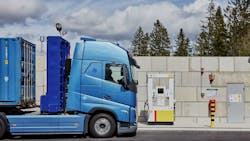Volvo Trucks is testing hydrogen fuel-cell electric trucks and predicts they will be on the market by the end of the decade, according to a press release. Volvo already offers battery-electric trucks and other commercial vehicles that run on renewable fuels such as biogas.
“We have been developing this technology for some years now, and it feels great to see the first trucks successfully running on the test track,” said Roger Alm, president of Volvo Trucks. “The combination of battery-electric and fuel-cell electric will enable our customers to completely eliminate CO2 exhaust emissions from their trucks, no matter transport assignments,” Alm said about Volvo’s multiple electric solutions.
See also: Fleets and their customers are driving decarbonization
Customer pilots are planned to start in a few years, and commercialization is planned for the second half of the 2020s.
Volvo has decided to invest in hydrogen in part to offer electric vehicles in developing countries. In countries with less robust electric grids, the charging infrastructure may not be able to meet the requirements of a Class 8 battery-electric vehicle, whereas hydrogen can be delivered and stored like today’s fossil fuels.
“Refueling can be as fast as a diesel truck,” Helen Alsiö, Volvo's vice president of powertrain product management, said in a promotional video.
Volvo hopes that the trucks will refuel in less than 15 minutes and have a range of about 600 miles to compete with diesel technology. The company also expects the total weight to be able to meet or exceed 65 tons, with two fuel cells able to generate 300 kW of electricity.
See also: Nashville dealership gets first Volvo EV certification in state
Fuel cells developed with Daimler
The fuel cells will be supplied by cellcentric, a joint venture between Volvo Group and Daimler Truck AG. Cellcentric was created when, in March 2021, Volvo acquired 50% of the partnership interests in the existing Daimler Truck Fuel Cell GmbH & Co. KG for about $631 million.
After being approved by voters during an April 24 referendum, cellcentric is planning to build a fuel cell factory in Weilheim an der Teck, Germany. With construction expected to begin in 2023, the facility will produce fuel cells specially developed for heavy vehicles.
As a developing technology, hydrogen fuel cells face hurdles. Refueling infrastructure for hydrogen trucks is underdeveloped. Additionally, not all hydrogen is “green hydrogen”—hydrogen whose production process utilized renewable energy sources.
“We expect the supply of green hydrogen to increase significantly during the next couple of years, since many industries will depend on it to reduce CO2. However, we cannot wait to decarbonize transport; we are already running late,” Alm said. “My clear message to all transport companies is to start the journey today with battery electric, biogas and the other options available. The fuel cell trucks will then be an important complement for longer and heavier transports in a few years from now.”
For more information on Volvo Group’s hydrogen truck efforts, visit their Youtube.
About the Author
FleetOwner Staff
Our Editorial Team
Kevin Jones, Editorial Director, Commercial Vehicle Group
Josh Fisher, Editor-in-Chief
Jade Brasher, Senior Editor
Jeremy Wolfe, Editor
Jenna Hume, Digital Editor
Eric Van Egeren, Art Director
